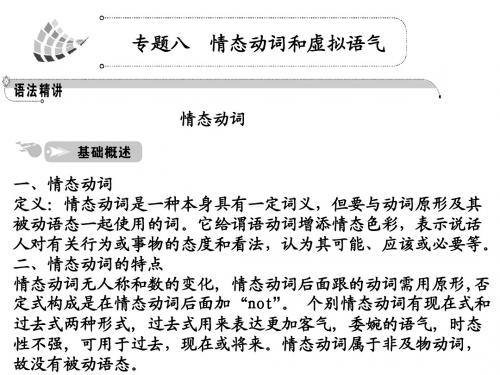2014高考英语 专题八 情态动词和虚拟语气复习课件(B
合集下载
虚拟语气讲解课件ppt.ppt

虚拟语气
虚拟语气在:在宾语从句中
[例句]
1. I wish she would be on my side. 我希望她能站在我一边。
2. I wish I were 10 years younger. 我但愿自己能年轻十岁。
3. I wish (that) you would get a good job. 我希望你能找到一个好职业。
• He insisted that he was right. 他坚称他是正确的。
认识到了贫困户贫困的根本原因,才 能开始 对症下 药,然 后药到 病除。 近年来 国家对 扶贫工 作高度 重视, 已经展 开了“ 精准扶 贫”项 目
虚拟语气
虚拟语气在:在宾语从句中
• 在would (had) rather(宁愿) 引导的宾语从句中
[例句] • It’s necessary that we should have a walk now.
我们有必要出去散散步。
• It’s natural that she should do so. 她这样做是很自然的。
1. It’s important that we should take good care of the patient. 重要的是我们要照顾好病人。
一、在条件从句中 (叫虚拟条件句),表示与事实相反 的条件。分三种情况(以 do 为例):
认识到了贫困户贫困的根本原因,才 能开始 对症下 药,然 后药到 病除。 近年来 国家对 扶贫工 作高度 重视, 已经展 开了“ 精准扶 贫”项 目
虚拟语气
虚拟语气在 在条件从句中
[例句]
• If you had come a few minutes earlier, you would have met him.
新高考英语一轮复习:情态动词及虚拟语气复习课件

例:Why must you be so stubborn? Must you make so much noise? If you must smoke, at least you could use an ashtray.
➢ 表示推断
意为“一定,准是”,表示有把握的推测。
例:That tall man must be a basketball player. He must be anxious to know the result. You must feel tired after a long walk.
例:It’s 5 o’clock, Jack will be in Paris now. It will be snowing in Beijing now.
Part 2 情态动词的用法
will 和 would 的用法
➢ 表示请求、建议
与第二人称的一般疑问句连用,表示请求,建议。
例:Will/Would you go with me? Will/Would you tell me the way to the station?
➢ 表示习惯、倾向
多用于第三人称,意为“通常,常常”
例:He will sit by the window for hours doing nothing. Some birds will fly to the south when the weather gets cold.
➢ 用来叙述真理或表示自然规律
➢ 表示请求或允许
意为“可否;可以”,在一般疑问句中could 可代替can,但比can语气更委婉,答语要用can。在 陈述句中表示“允许(做某事)”,不用could。
例:—Can/Could you help me? —Yes, I can. You can have the book when I have finished it. You can’t pick flowers in this park.
高考英语专题复习:虚拟语气课件

条件从句中的谓语动词
主句中的谓语动词
had done
would/could/should/might have done
2、与现在事实相反的虚拟条件句
Jack: Rose, thank you for your company. If you didn’t keep me company, my life would be dull. Rose: If there weren’t your love, I wouldn’t know how to deal with the present situation.
5、倒装虚拟条件句 If there weren’t your love, I wouldn’t know how to deal with the present situation.
Were there not your love, I wouldn’t know how to deal with the present situation.
主句中谓语动词
would have done would do would do would do would …
1. Sorry, I am too busy now, if I__D___ time, I would certainly go
for an outing with you. A. have had B. had had
条件从句中的谓语动词
主句中的谓语动词
did/were
would/could/should/might do
3 3、与将来事实可能相反的虚拟条件句
Jack: Rose, if I should be alive, I would love you forever. Rose: If you were to live, we would stay together happily. Jack: If we had a chance to get married, we would enjoy our life to the fullest.
高三英语一轮语法复习情态动词和虚拟语气课件

1. 对现在或将来的推测(结构:情态动词+do) 情态动词可以用来表示对现在或将来的情况进行推测 She could be lost. 她可能迷路了。 注意 如果是对现在或未来正在发生的事情进行推测,可以使用“情 态动词+be doing”结构。 My friend may be still sleeping at home now. 我的朋友现在可能正在家里睡觉。
(2)表示推测,表示“肯定,一定”之意,此时,must只用于肯定句。在否定句 或疑问句中,用can / could。
(3)表示“偏偏,非要,硬要”,有时表示不巧,有时表示固执,
通常都是指令人不快的事。
4. shall的用法
(1)用于第二、三人称,表示说话人的命令、警告、强制、允诺、威胁或 决心等。
考点3 “情态动词+have done”表示责备的语气
可用于表责备语气的情态动词有:should, ought to, could, might, need等,它们常被用来表示说话人对过去事情的不满或遗憾,带 有较强 烈的责备语气,其结构为“情态动词+have done”。
1. should(ought to)have done“本应该……” 表示过去应该做而(实际)没有做的事情,含有责备或遗憾的语 气,其否定形式为“should not/ought not to have done”。should have done 还可以用来表示惊讶、赞叹等情绪 2. could/might have done “本来能够(会)……” 表示过去本来能够(可以)做某事,但实际上没有做到。 3. need+have+done “原本需要做……” 表示本来需要做某事而没有做,“needn’t+have+done”则表示“本来 不必做某事而做了”。
语法篇专题情态动词和虚拟语气

情态动词
用法
例句
can和could
表示能力
He can speak English better than you.
表示请求 或允诺?
You can have the book when I have finished it. Could you come again tomorrow?
表示客观可能性
should have done
过去本来应该……,而实际上没有……
The plant is dead. Maybe I should have given it more water.
ought to have done
过去本该……,而未……
You ought to have given him more help.
专题八 情态动词和虚拟语气
情态动词
一、情态动词 定义:情态动词是一种本身具有一定词义,但要与动词原形及其被动语态一起使用的词。它给谓语动词增添情态色彩,表示说话人对有关行为或事物的态度和看法,认为其可能、应该或必要等。 二、情态动词的特点 情态动词无人称和数的变化, 情态动词后面跟的动词需用原形,否定式构成是在情态动词后面加“not”。 个别情态动词有现在式和过去式两种形式, 过去式用来表达更加客气, 委婉的语气, 时态性不强, 可用于过去,现在或将来。情态动词属于非及物动词,故没有被动语态。
三、情态动词的语法特征 (1) 情态动词不能表示正在发生或已经发生的事情,只表示期待或估计某事的发生。 (2) 情态动词除ought 和have 外,后面只能接不带to 的不定式。 (3) 情态动词没有人称和数的变化,即其第三人称单数不加s。 (4) 情态动词没有非限定形式,即没有不定式,分词形式,也没有相应的动名词。 四、情态动词的基本用法
用法
例句
can和could
表示能力
He can speak English better than you.
表示请求 或允诺?
You can have the book when I have finished it. Could you come again tomorrow?
表示客观可能性
should have done
过去本来应该……,而实际上没有……
The plant is dead. Maybe I should have given it more water.
ought to have done
过去本该……,而未……
You ought to have given him more help.
专题八 情态动词和虚拟语气
情态动词
一、情态动词 定义:情态动词是一种本身具有一定词义,但要与动词原形及其被动语态一起使用的词。它给谓语动词增添情态色彩,表示说话人对有关行为或事物的态度和看法,认为其可能、应该或必要等。 二、情态动词的特点 情态动词无人称和数的变化, 情态动词后面跟的动词需用原形,否定式构成是在情态动词后面加“not”。 个别情态动词有现在式和过去式两种形式, 过去式用来表达更加客气, 委婉的语气, 时态性不强, 可用于过去,现在或将来。情态动词属于非及物动词,故没有被动语态。
三、情态动词的语法特征 (1) 情态动词不能表示正在发生或已经发生的事情,只表示期待或估计某事的发生。 (2) 情态动词除ought 和have 外,后面只能接不带to 的不定式。 (3) 情态动词没有人称和数的变化,即其第三人称单数不加s。 (4) 情态动词没有非限定形式,即没有不定式,分词形式,也没有相应的动名词。 四、情态动词的基本用法
2014届高三英语一轮复习专项课件:情态动词和虚拟语气(72张PPT)

返回目录
专题8
正反解读情态动词和虚拟语气
• • • •
正 面 3.[2012•北京卷] We ________ the difficulty together, but 解 why didn't you tell me? B.might face 读 A.should face
C.could have faced D.must have faced
网站版权所有
返回目录
专题8
正反解读情态动词和虚拟语气
• • • •
正 面 解 读
1.can, could的用法 规则1:表示体力或脑力(知识、技能)所产生的能力。 如: Her mother can speak French. He could read books in English when he was only five. 规则2:表示客观的可能性。如: Anybody can make mistakes. Man cannot live without air. 规则3:表示请求建议,用could 比 can语气更委婉 (回答用原形)。如: Could you wait a few days for the money? Could you be here at eight o'clock tomorrow morning?
A. lives C. has lived B. would live D. were to live
[解析] D 考查虚拟语气。根据主句中的wouldn't可判 断是虚拟语气。if引导的条件状语从句对将来进行虚 拟,从句用were to do或should do或过去式。所以选D。
网站版权所有
网站版权所有
高考英语复习语法专项提升专题八情态动词和虚拟语气市赛课公开课一等奖省名师优质课获奖课件

Were I you, I would stay. 倘若我是你,我就留下。
Should I be free tomorrow, I would come. 假如我明天有空,我会来。
Had you taken my advice, you wouldn’t have failed in the examination. 假如你听了我提议,你就不会考试不及格了。
10/64
3.may, might用于必定句中能够用来表示推测,意为“可能”; 用于否定句中也能够表示推测, may not 意为“可能不”,表示 一个不太确定语气。
The traffic is heavy these days. I might arrive a bit late, so could you save me a place? 最近这些天交通拥挤,我有可能迟到一会儿,所以请你给我留 个位子好吗?
How could you do such a silly thing? 你怎么能做那样蠢事呢? (2)cannot...too/enough 表示“不论……也不过分”, “越……越好”。
You can’t be too careful while driving. 开车时越小心越好。
7/64
6.“may as well+动词原形”意为“最好, 不妨, 倒不如”。 You may as well do it at once.
情态动词+have done
1.could have done用于必定句, 表示原来能够做, 而实际上 未做, 用疑问或否定形式对过去发生行为表示推测, can’t have done 多用于语气强烈否定, 意为“不可能做 过”。
The accident could have been avoided. 这场事故原来是能够防止。
Should I be free tomorrow, I would come. 假如我明天有空,我会来。
Had you taken my advice, you wouldn’t have failed in the examination. 假如你听了我提议,你就不会考试不及格了。
10/64
3.may, might用于必定句中能够用来表示推测,意为“可能”; 用于否定句中也能够表示推测, may not 意为“可能不”,表示 一个不太确定语气。
The traffic is heavy these days. I might arrive a bit late, so could you save me a place? 最近这些天交通拥挤,我有可能迟到一会儿,所以请你给我留 个位子好吗?
How could you do such a silly thing? 你怎么能做那样蠢事呢? (2)cannot...too/enough 表示“不论……也不过分”, “越……越好”。
You can’t be too careful while driving. 开车时越小心越好。
7/64
6.“may as well+动词原形”意为“最好, 不妨, 倒不如”。 You may as well do it at once.
情态动词+have done
1.could have done用于必定句, 表示原来能够做, 而实际上 未做, 用疑问或否定形式对过去发生行为表示推测, can’t have done 多用于语气强烈否定, 意为“不可能做 过”。
The accident could have been avoided. 这场事故原来是能够防止。
2014高考英语二轮_语法篇专题:专题8__情态动词和虚拟语气

表示推测(客观推测)to be home by now.
Dared he break the traffic regulations again? She doesn’t dare to stay at home alone at night.
过去情况 的推测
情态动词 + have It must/may/might/could have rained last night. The ground is +过去分词 wet. The door was locked. He can (could) not/may (might) not have been at home. Can/Could he have gotten the book?
表示过去的习惯动作,没有“现 已无此习惯”的含义 During the vacation he would visit me every week. It would be about ten when he left home.
表示估计和猜想
【考点一】考查表示能力的情态动词 情态动词can和could可以表示能力;be able to do强调设法成功完 成某一具体动作(相当于manage to do/succeed in doing)。 If it were not for the fact that she can’t sing, I would invite her to the party. 【即学即练】 单项填空 ①The fire spread through the hotel very quickly but everyone ______ get out. A. had to B. would C. was able to D. could 解析:选C。考查情态动词。have to不得不; would表示意愿或过 去常常;could倾向于表示经过长期训练而获得的能力;be able to 表示经过努力而能够做到的事或成功地做了某事。根据句意,选 C。
